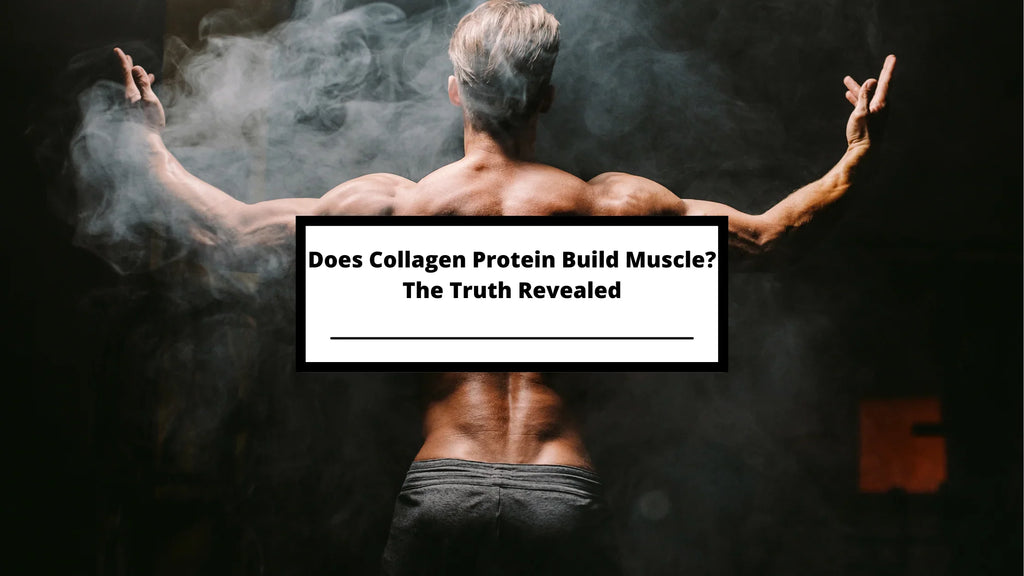Does Collagen Protein Build Muscle? The Truth Revealed

Picture this: you're at the gym, working tirelessly to build lean muscle and sculpt your physique. You've heard about the benefits of collagen protein, but you're unsure if it really lives up to the hype. Can collagen protein actually help build muscle? In this blog post, we will dive deep into the scientific evidence surrounding collagen protein and muscle growth. Discover the facts behind this claim and make educated choices regarding adding collagen protein powders and collagen drinks to your daily workout regimen.
Understanding Collagen Protein
Before we explore the relationship between collagen protein and muscle building, let's briefly understand what collagen protein is and its importance in the body. Collagen is the most abundant protein in our bodies, responsible for providing structure and support to connective tissues, tendons, and skin. It plays a crucial role in maintaining healthy joints, as well as promoting youthful and vibrant skin.
Protein collagen powder is a nutritional supplement that combines the benefits of both protein and collagen. They are usually derived from animal sources such as bovine or marine collagen and can be easily added to everyday food or drinks to make for an easy protein boost.
Many people do not like whey or milk based drinks as they find them too heavy or are lactose/dairy intolerant so taking they struggle with this as a protein source. They look to alternative protein sources such as collagen which is lighter, easier to absorb and is 100% dairy free.
The Relationship Between Collagen Protein and Muscle Building
Can collagen protein actually help build muscle? There are claims that collagen protein, mainly collagen peptides, can enhance muscle growth and improve performance during resistance training. But what is the scientific consensus on this?
Whey protein and milk-based protein drinks have usually been the go-to source for most bodybuilders and athletes, but could collagen also offer the same benefits of muscle building as these products?
Evidence for Collagen Protein's Impact on Muscle Growth
Multiple studies have explored the effects of collagen protein on muscle synthesis, growth and strength. One study published in the British Journal of Nutrition investigated the impact of collagen peptide supplementation on fat-free mass and strength in older men with sarcopenia (age-related muscle loss). The results showed that collagen peptides, when combined with resistance training, led to a significant increase in fat-free mass and improved muscular strength. The key was to combine nutrition with an effective exercise program.
Another study conducted by The Journal of Nutrition in 2020 examined the effects of combined collagen peptides and vitamin C supplementation on collagen synthesis in recreationally active men. The findings revealed enhanced collagen synthesis when participants consumed collagen peptides in amount over 30g per day, further suggesting the potential benefits of collagen protein for muscle development.
Contradictory Opinions and Limitation
Despite the promising findings, it's essential to address conflicting views on collagen protein and muscle growth. Some researchers argue that collagen protein may not provide sufficient essential amino acids compared to other protein sources, making it less effective for muscle building. Additionally, variables such as dosage, timing, and individual factors may influence the results of studies on collagen protein and muscle synthesis.
It is critical to note that collagen proteins are an excellent source of BCAAs and most amino acids (except Tryptophan). The levels to be found are slightly below that found in whey protein, but still sufficient for muscle synthesis as documented in the studies above. As collagen becomes more accepted for muscle development and growth further studies should validate this as mass acceptance of collagen becomes the norm.
Incorporating Collagen Protein into a Muscle Building Regimen
If you're considering incorporating collagen protein into your fitness routine, here are some recommendations to keep in mind. Here are some sample ways you can use to consumer collagen:
- Powders: such as Vieve Collagen Protein Powder offer an easy way to mix a scoop of collagen protein into you everyday food & drinks. They usually have a 10g dosage and can be easily incorporated into your everyday fitness routine
- Drinks: collagen based protein drinks such as Vieve Protein Water offer an easy on-the-go source of collagen which you can take with you to the gym for a quick 20g protein boost.
- Tablets: for those who want a truly tasteless option for boosting your collagen levels they can take a tablet based form that is easy to swallow
To optimise muscle development, consider combining collagen protein with other high-quality protein sources, such as whey or plant-based protein, to ensure you're obtaining a complete amino acid profile.
It should be noted that collagen based creams and powders which are taken topically do not increase your protein intake as the collagen isn't absorbed into the skin.
Best Practices and Considerations for Collagen Protein Consumption
There are many important blog posts we have to help you guide your collagen consumptions habits:
- How much collagen do you need? A simple guide to help you understand the right level of collagen for you
- Understanding the benefits of collagen drinks: learn the many important benefits of collagen based drinks if incorporated properly into your everyday routine
- How long does it take collagen supplements to work: learn about the time needed to see the benefits. Hint: they don't happen overnight!
While there's no one-size-fits-all approach although it's important to note that collagen protein is generally safe, but some individuals may experience mild digestive discomfort. As always before starting a round of supplements especially if you have any pre-existing health conditions or concerns, it is advisable to consult with a healthcare professional.
Conclusion:
So, does collagen protein build muscle? The scientific evidence suggests that collagen protein, specifically collagen peptides, can play a role in promoting muscle growth and enhancing performance when combined with resistance training. Collagen protein can be a valuable addition to your muscle-building regimen, but it should not be relied upon as the sole protein source. Ultimately, making informed decisions based on the available scientific evidence will help you optimize your muscle-building journey.
Take the first step and explore the potential of collagen protein in building lean muscle and supporting your fitness goals. Use this information as a guide to incorporate collagen protein into your routine thoughtfully. Embrace the power of science and unlock your full muscle-building potential with collagen protein.
Above Vieve Protein Waters & Powders:
Vieve is the world's first high-protein drink and protein water to use collagen as its primary protein source, offering a true non-dairy alternative to whey and milk based drinks. Each bottle contains 20,000mg of hydrolysed collagen.
Our collagen powder mixes easily into everyday food & drink with just a tablespoon to give you an instant 10g collagen-based protein boost.
Head over to our shop to check out our selection of protein drinks and protein waters. Find out more about Vieve here. Vieve Protein Water is also available to buy from Amazon or Ocado.
